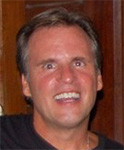Review — FEEDING THE KIDS TO THE SHARKS by J.J. Martin (Papua New Guinea)
 Feeding The Kids To The Sharks: A Stay-at-Island Dad Copes with Fighting, Biting, and Feeding Frenzies in Micronesia
Feeding The Kids To The Sharks: A Stay-at-Island Dad Copes with Fighting, Biting, and Feeding Frenzies in Micronesia
J.J. Martin (Papua New Guinea 1989-90)
Maske Publishing
July 2021
340 pages
$14.99 (paperback), $4.99 (Kindle)
Reviewed by Martin Ganzglass (Somalia 1966–68)
•
Feeding the Kids to the Sharks is a marvelous read on multiple levels, not only for the Peace Corps community but for anyone who wants to immerse themselves in the culture of Micronesia, complete with a cast of native islanders, crazy and dedicated ex-pats, elite champion surfers, Aussie naval personal, coral harvesters, biosecurity specialists, and PCVs.

J.J. Martin
In September 2007, RPCV Jeff Martin, formerly a communications and public relations employee of an NGO in Washington, D.C., and the husband of Bette, the newly appointed Deputy Peace Corps Director for the Federated States of Micronesia, arrived with their daughters, Devon and Tess, in Kolonia, the capital of Pohnpei State. Micronesia, populated by about 107,000 people, speaking nine languages, was almost 8,000 miles from home and 4,600 miles from San Francisco.
With his wife required to travel to visit PCVs among many of the 607 islands spread over one million square miles of ocean, Jeff was responsible for raising their daughters. He was the “home daddy” — his term, not mine. As the title implies, it was, in the beginning, a frustrating, thankless task, full of aggravation, back talk, disrespect, much yelling and losses of temper, anger so intense it ended sometime with physical punishment and the dark wish to feed the kids to the sharks. The home daddy experience was fraught with unexpected dangers of a physical nature – a wide variety of vicious insect bites, dog bites, giant flying roaches, purple centipedes, stinging scrapes from coral and getting lost in the jungle, as well as separation anxiety and constant sibling bickering, poking, punching, kicking and screaming, not to mention bullying at school,
Martin tells the saga of his life as home daddy in a witty, sometimes snarky humorous way, with catchy little quotes at the beginning of each chapter. (My favorite, attributed to David Lodge is “Literature is mostly about having sex and not so much about having children; life is the other way around.”) Several newspaper reviews noted this book is a laugh out loud read, the perfect remedy for the stress and strain of the conspiracy politics and angry rhetoric rampant in America today. And it is. There were places in the book, where as a parent, I recognized the situation and laughed until I cried. And RPCVs will see the humor in how Martin fulfills the 3rd Goal of Peace Corps — “helping to promote a better understanding of other peoples on the part of Americans.” But Feeding the Kids to the Sharks is much more than a cleverly told humorous story.
It has two major underlying themes:
- What is the quality of life you want, for yourself, your partner, and your children; and
- What should be the role of men in the 21st century in raising the children they have brought into this world.
Peace Corps service is especially relevant to the quality-of-life theme.
Martin and his family are immersed in a Micronesian culture that is forgiving, communal, and non-conformist, one that focuses on the present state of mind and not the past or the future. Americans’ constant pursuit of money, prestige, position, and possessions is alien to the islanders. For the people of Pohnpei, if something does not have a use to them, they don’t have a name for it. The longer the Martins stay in Micronesia, the more tenuous the long thread back to their “regular” lives in Washington, D.C. becomes.
The second theme is Martin’s realization that being a “home daddy,” is a real job. It takes a full commitment to do it well, to remain focused on his daughters, to keep the house running, to listen to his kids and to be there for them, all the time. The one criticism I have of the book is Martin writes as if he were the first father to discover that being a “home daddy,” is work. Even in 2007 stay at home dads were not rare. Today, all but the most Neanderthal male in our society understands mothers who remain at home running the household and raising the kids are doing unpaid but real work.
Martin peppers the book with snippets of information that somehow all become interwoven with the saga of being a “home daddy.” It is filled with useful knowledge like how to convert from Fahrenheit to Celsius,(F=C x 9/5+ 32), somewhat less useful knowledge like how to repair a galley refrigerator with a water-cooled condenser (basic thermodynamics, Martin assures us,) surprising facts like Micronesia has more Army recruits per capita than any State in the Union, due to its Compact of Free Association with the United States, or what beers real Australians drink (it’s not Fosters,) and obscure dinner party facts like championship sporting events produce tee-shirts for both teams, proclaiming they won the Super Bowl or World Series. The losing team’s tees end up in developing countries where Martin reports seeing shirts proudly asserting “Tampa Bay Rays-2008 World Series Champs,” when the Philadelphia Phillies won that year.
The bottom line is Martin must have done something right in the child-rearing department. His oldest daughter designed the book cover, and he even gives her credit.
•
 As a PCV in Somalia, reviewer Martin R. Ganzglass served as legal advisor to the Somali National Police Force. Upon entering private practice he represented the EPLF (Eritrean Peoples Liberation Front) and the Embassy of Eritrea in Washington; and, in 1998-1999 helped to draft the Eritrean Penal Code and Code of Criminal Procedure.
As a PCV in Somalia, reviewer Martin R. Ganzglass served as legal advisor to the Somali National Police Force. Upon entering private practice he represented the EPLF (Eritrean Peoples Liberation Front) and the Embassy of Eritrea in Washington; and, in 1998-1999 helped to draft the Eritrean Penal Code and Code of Criminal Procedure.
He has written numerous books including a series of novels about the American Revolution, and most recently in 2021 Goats: And Other Stories.
No comments yet.
Add your comment